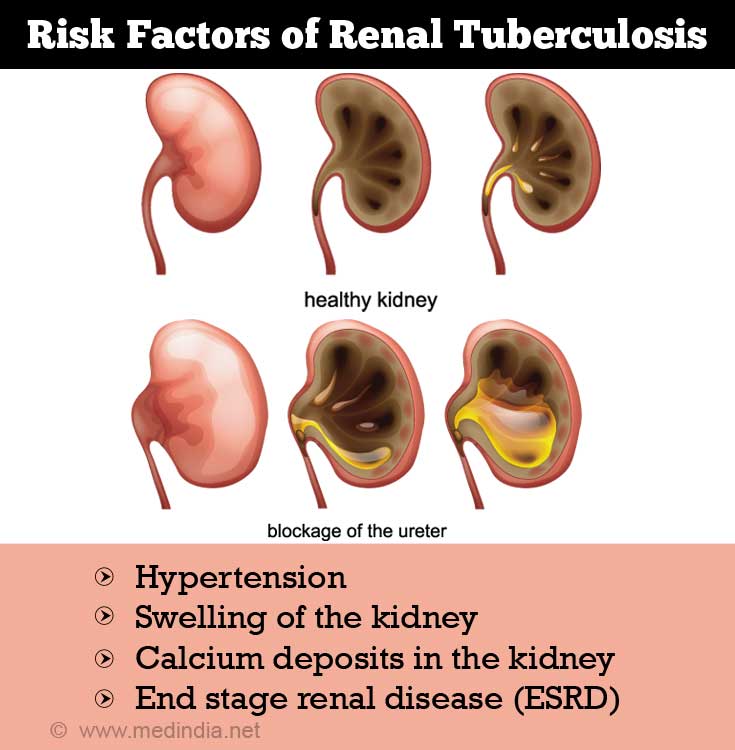- Renal Tuberculosis in the Modern Era - (https://www.ncbi.nlm.nih.gov/pmc/articles/pmc3541747/)
- Tuberculosis of the Genitourinary System-Urinary Gract Tuberculosis: Renal Tuberculosis - (https://www.ncbi.nlm.nih.gov/pmc/articles/PMC3737618/)
- Tuberculosis and the Kidney - (https://jasn.asnjournals.org/content/12/6/1307)
- Assessment of Diagnostic Techniques of Urinary Tuberculosis - (https://www.ncbi.nlm.nih.gov/pubmed/23795272)
- Renal Tuberculosis: The Enigma Continues - (https://www.longdom.org/open-access/renal-tuberculosis-the-enigma-continues-2161-1068-1000186.pdf)
- Medical Management of Genitourinary Tuberculosis - (https://www.ncbi.nlm.nih.gov/pmc/articles/PMC2684341/)
What is Renal Tuberculosis?
Renal tuberculosis (renal TB) or tuberculosis of the kidney is a type of extra-pulmonary tuberculosis that affects the kidney. Extra-pulmonary tuberculosis refers to tuberculosis that affects an organ outside the lungs. Other sites of extra-pulmonary tuberculosis are the pleura (the covering of the lungs), the lymph nodes, the fallopian tube in females and the epididymis in males, the bone marrow and the hindbrain.(1✔ ✔Trusted Source
Renal Tuberculosis in the Modern Era
Go to source)
Renal tuberculosis may affect either one or both kidneys. The inner part of the kidney called the medulla is usually affected, though the infection usually starts from the cortex which is the outer part. Renal tuberculosis is sometimes a part of the tuberculosis that affects the entire genitourinary tract. Genitourinary tuberculosis accounts for around 15-20% of all cases of extra-pulmonary tuberculosis.
What is the Cause of Renal Tuberculosis?
Renal tuberculosis is caused by Mycobacterium tuberculosis, which is a common cause of respiratory infection especially in the low socio-economic regions of the underdeveloped and developing countries. It may also be caused by other variants including Mycobacterium bovis.
The kidneys can get infected through the spread of infection from other parts of the body especially the lungs via the blood. The infection of the kidneys occur anytime between five to twenty years, after a lung infection. This type of infection of kidneys that spreads from other sites in the body that are already affected is referred to as secondary tuberculosis.
Primary renal tuberculosis has also been caused by the mycobacterium in the BCG vaccine when the vaccine is directly instilled into the bladder. The BCG vaccine is normally administered to babies to protect them against tuberculosis. A more recent use is in the treatment of superficial bladder cancer, where the vaccine is instilled into the bladder. This approach has caused some cases of renal tuberculosis.
Reduced immunity like in people with HIV, diabetes patients and patients taking immunosuppressive drugs following organ transplantation increases the risk of developing renal tuberculosis.
What are the Symptoms and Signs of Renal Tuberculosis?
Patients with renal tuberculosis may not suffer from any symptoms. Clinical features may include the following:
- Presence of protein or pus in the urine on testing
- Absence of bacteria on testing urine
- Presence of blood in the urine
- Failure to respond to antibiotics
- Reduced kidney function
- Increased frequency of passing urine, feeling of burning while passing urine, and getting up frequently at night to pass urine when the lower urinary tract is also involved
- Symptoms of lung tuberculosis may also be present which include fever, night sweats and productive cough(2✔ ✔Trusted Source
Tuberculosis of the Genitourinary System-Urinary Gract Tuberculosis: Renal Tuberculosis
Go to source)
What are the Risks and Complications of Renal Tuberculosis?
Risks and Complications of renal tuberculosis include the following:
- Calcium deposits in the kidney, which indicates a progressive deterioration of kidney function
- Hypertension
- Development of cellular changes called keratinizing squamous metaplasia, which predisposes to a type of cancer called squamous cell carcinoma
- Abscess formation that spreads around the kidney
- Extension of the tuberculosis to the ureters, the tubes that carry urine from the kidney to the urinary bladder. The infection can result in ulceration and narrowing of the tube, thereby obstructing the flow of urine into the bladder
- Extension of tuberculosis to the urinary bladder. The bladder may become small and contracted, called thimble bladder. However, the tuberculosis infection more commonly spreads to the urinary bladder from the epididymis in males, or when the BCG vaccine is instilled into the bladder
- Swelling of the kidney called hydronephrosis
- End stage renal failure(3✔ ✔Trusted Source
Tuberculosis and the Kidney
Go to source)

How to Diagnose Renal Tuberculosis?
Renal tuberculosis is difficult to diagnose since not too many physicians will suspect the condition. However, it is important to diagnose it since the patient can recover completely with the right treatment.
Tests used to diagnose renal tuberculosis include the following:
Blood tests:
Blood tests that should be done include the following:
- A full blood count and ESR (erythrocyte sedimentation rate) which may indicate the presence of an infection. The ESR should be repeated on a monthly basis after starting treatment to test for the response to the treatment
- Renal function tests, which include measurement of blood urea, uric acid and creatinine to test the functioning of the kidneys
- Tests to evaluate calcium metabolism in case of calcium deposits in the kidney
In this test, a small amount of tubercular protein is injected into the skin of the inner forearm. A firm red bump (induration) appears after 2 to 3 days if the person has been previously exposed to M tuberculosis. The test is positive in around 80% cases of renal tuberculosis.

Urine tests:
The following urine tests may be done to diagnose renal tuberculosis:
- A urine routine examination which may show the presence of pus cells and red blood cells
- Urine culture on specific media that promote the growth of mycobacteria. It should be done on three to five early morning urine samples. It takes 4 to 8 weeks for the results to be available
- The culture can be done on a specific liquid medium, which like the polymerase chain reaction (PCR) provides quicker results resulting in early detection of the infection(4✔ ✔Trusted Source
Assessment of Diagnostic Techniques of Urinary Tuberculosis
Go to source)
Imaging tests:
Imaging tests of the urinary system that may be used in the diagnosis of renal tuberculosis include the following:
- Intravenous pyelogram / Intravenous urogram- In this imaging test, a dye is injected into the blood which is filtered by the kidneys, and passes through and delineates the urinary tract. It can detect structural and functional problems caused by tuberculosis on the urinary tract. The test should be repeated after three to four months after starting treatment to check if any surgical treatment is needed
- CT scan, which is useful in assessing advanced disease of the kidney
- X-ray, which may show the presence of calcium deposits
- Ultrasound, to monitor response to treatment(5✔ ✔Trusted Source
Renal Tuberculosis: The Enigma Continues
Go to source)
How to Treat Renal Tuberculosis?
Treatment of renal tuberculosis is with anti-tuberculosis medications. The medications are administered as a combination and not singly since the mycobacteria can develop resistance.
In India, the following treatment is administered:
- Patients are treated initially with four drugs, Isoniazid, Rifampicin, Pyrazinamide and Ethambutol for 2 months to kill most of the bacteria. This is followed by treatment with two drugs, isoniazid and rifampicin for a further period of 4 months to kill persisting bacteria.

- Directly observed treatment (DOT), where the medication is taken in front of a healthcare worker, is recommended to ensure that the patients take their medication regularly
- Patients with multidrug resistance receive treatment with second-line drugs for a longer duration, usually with an initial phase of 8 months followed by a maintenance phase of around 12 months
- In patients with reduced kidney function, the dose of ethionamide, if used, should be reduced. Streptomycin should not be used in these patients
- In patients with HIV, rifabutin is given instead of rifampicin since rifampicin has a high risk of adverse effects. The treatment is also prolonged for a period of 9 months
Surgery may be necessary for complications of tuberculosis on the urinary tract. Surgical procedures used include:
- Partial or total nephrectomy, where the damaged or non-functional kidney is removed
- Procedures to repair narrowed ureters or damaged bladder. The narrowed ureter may be dilated and a stent may be placed to relieve the obstruction. Severe scarring of the ureters or urinary bladder may require procedures like ureteral replacement or reimplantation, urinary diversion procedures and augmentation cystoplasty (procedure to enlarge the urinary bladder)(6✔ ✔Trusted Source
Medical Management of Genitourinary Tuberculosis
Go to source)









